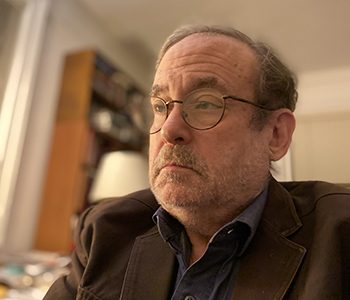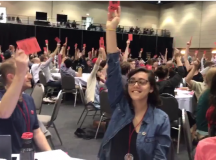Mitchell Cohen is co-editor emeritus of Dissent in New York and professor emeritus of political science at Bernard Baruch College of the City University of New York. His books include Zion and State: Nation, Class, and the Shaping of Modern Israel and The Politics of Opera. He was interviewed in late February. A version of this interview is to appear in Spanish.
The Western Left, the Israeli Right and the Delegitimisation of the Jewish State
Question: Efforts to delegitimise the Jewish state are at full and loud throttle since Israel’s response to the October 7 massacres. This is taking place both the diplomatic and the intellectual worlds. In 2007 you seem to have perceived an earlier phase of this phenomenon in “Anti-Semitism and the Left that Doesn’t Learn,” your widely discussed article in Dissent. In it you pointed to a particular problem coming from the “liberal and left intelligentsia in the United States and Europe.” Are we now seeing the same thing in 2024? Are there new dimensions to it?
Mitchell Cohen: The attack on Israel’s legitimacy has intensified but it is part of a larger story. Opposition to Zionism within the left goes back to the founding of Zionism, although there has been real sympathy too. The current situation has long and short-term contexts. I wrote that article a few years after the UN’s Durban conference of 2001, which unleashed a wave of attacks on Israel for racism. But the problem also descends from decades of political developments, one of which was the assassination of Israeli premier Yitzhak Rabin by a rightwing Jewish zealot in 1995.
That murder also targeted the Oslo Accords, the best chance since 1949 for an Israeli-Palestinian peace and the signing of which put anti-Zionism on the defensive. Oslo’s foes gained mounting strength in the later 1990s. One was the Israeli right-wing led by Netanyahu, which always sought to blur reckless, ultra-nationalist goals with real security questions. The other was Hamas, whose bombing campaign in the spring after Rabin‘s murder played an essential role in electing Netanyahu. Hamas has always opposed compromise and its ultimate purposes have been to displace secular Palestinian nationalists with Islamists and to replace Israel with a Muslim state including the West Bank, Gaza and what is now Israel proper. In 2000, at Camp David, Ehud Barak offered a far-reaching compromise to Palestinians but Arafat did not accept it and the Second Intifada began. In this context an anti-Zionist campaign in the intellectual world was ushered along from Durban.
Israeli foreign policy has been dominated for almost three decades – with some interludes – by Netanyahu. One, and it is only one, staggering bungle was to allow Hamas to be strengthened in Gaza in order to weaken the Palestinian Authority and thereby to thwart Israeli-Palestinian compromise. It played, finally, into Hamas’s already blood-stained hands, as 7 October showed. This wasn’t just shortsightedness but fits into a long-standing pattern in the history of the Zionist rightwing, which I explored in my book Zion and State (Columbia University Press). That pattern consists in very consequential errors of political judgement based on a resentment-filled, misbegotten ideological orientation. It contrasts sharply to the social democrats of Mapai (Israel Workers’ Party) which, led by David Ben Gurion, dominated the struggle for Israeli statehood. Crucial decisions made by Ben-Gurion and Mapai were almost always measured and perceptive. Nowadays anti-Zionists seek to rewrite Israel’s history, demonising the Jewish state as a creation of Western imperialism – this is an historically spurious charge – by excising the role of the left in creating Israel. At the same time they dance around or excuse the fact that Palestinian nationalists allied themselves to Hitler and Mussolini.
To answer your question more fully, we must take into account what has happened within a highly visible part of the intelligentsia in recent decades. There has been in the university and intellectual worlds a rise in what is called ‘post-modernism’ and the like, which made it a point of turning many things upside down through selective use of history and ideological language games. Ironically, this even includes part of this intelligentsia’s own history. Edward Said complained that he could not convince Jean-Paul Sartre, who was not a post-modernist but an intellectual hero of the left and Michel Foucault, who was a seminal post-modern influence, of his position on the Israeli-Palestinian conflict. They understood something he didn’t – or didn’t want to understand.
Anti-Zionism is part of a larger intellectual crack-up on the left with distant roots. There is now a kind of meeting point between simplistic post-modernism and simplistic anti-imperialism. This conjuncture can be called ‘the anti-imperialism of fools,’ a phrase that echoes the famous criticism of antisemitism on the left in the late 19th century. When some on the left tried to blame ‘Jewish capitalists’ for Europe’s woes, it was branded ‘the socialism of fools.’ Formulations of both the antisemitism of fools and anti-imperialism of fools depend on intellectual twisting and turning until somehow, no matter what, blame is ascribed to, respectively, Jews and Zionists. Ominously, that ascription is often there before the twisting and turning.
Opposition to imperialism and colonialism has always been part of any morally intelligent left-wing programs and should be. Decolonisation after World War II was of world historical importance. In many ways it culminated in Nelson Mandela’s heroic leadership of South Africa’s liberation from apartheid. But three decades later, the party he led is in miserable shape, as is South Africa as a whole, and it faces electoral decline. So, it seeks to make itself the moral leader of the ‘Global South’ and accuses Israel of genocide and apartheid but won’t condemn Russia’s invasion of Ukraine. It is a species of scapegoating and has attracted great support in parts of the world including from the western left. But those supporters are reminiscent of what a New York cultural critic, Harold Rosenberg, once called (referring to New York intellectuals) as a ‘herd of independent minds.’
Nobody can take a walk in Tel Aviv or Haifa and see apartheid. Using such words is a vulgar, opportunistic misapplication of political terms, corrupting their content. If you believe that Israel is an ‘apartheid state’ then you can also believe that Donald Trump won the 2020 American elections and that Hamas with its Islamist supremacism is a force of liberation even if – well, sorry about that little slip by brave ‘resisters’ – they rape Jewish women.
However, only similarly skewed believers can deny that Netanyahu’s government – and the Likud – relies on racists and has disgraced the Jewish state. Israel’s woes today come after decades of rightwing dominance, not only anti-Semitism abroad. It doesn’t minimise the danger of antisemitism, including when it is in anti-Zionist disguise, to say that those woes and that rightwing dominance are tied. One result is a worldwide crisis in Jewish political culture and great damage to the fabric of Israeli society. The battle last year over the proposed ‘judicial overhaul,’ which actually aimed to empower rightwing priorities, represents an essential example of it. It was also exemplified by joint lists of the Likud and Ben-Gvir’s racist ‘Jewish Power’ party in four urban areas in Israel’s February 2024 municipal elections.
It is also imperative, however, to recognise that the problem in Israel has a dimension that is not specifically Israeli: social democratic parties and the democratic left throughout the world have been in intellectual trouble since at least the 1970s. In the Israeli case, 1977 is a transformative date because it was then that the rightwing first came to power. In the later 20th century Israeli governments fostered neoliberalism within the frontiers of Israel proper (the pre-1967 war borders), all while building a welfare state for settlers in the territories occupied in 1967. Here Ben-Gurion was right again. He once declared that the most important task of a prime minister is to set priorities. These were the wrong priorities.
Cognitive Dissonance from Sidney Webb to Judith Butler
Question: There seems to be a dramatic divide between realities in the Mideast and the prominence of fierce intellectual discourses challenging Israel’s very existence. How do you see this gap?
Mitchell Cohen: A wise American socialist once said to me: ‘Never underestimate the power of cognitive dissonance.’ I think its impact tells us a lot about the disconnect. When hard realities interfere with preset ideas, you defend those ideas stubbornly and blindly rather than reinvent or reshape them. It is not the first time something like this has happened. Remember those on the left who back in the 1930s apologised for Stalinism. Somehow, they ‘understood’ Stalinist behavior as long as there was justification with anti-imperialist or anti-capitalist rhetoric. By contrast, it was always possible to advocate leftwing ideas like social and economic egalitarianism, without making excuses for murderers who declare themselves liberators.
Here’s an historical example: Lord Passfield. He is not much remembered these days. He was the British Colonial Secretary responsible for the 1930 ‘Passfield White Paper’ which, essentially, began to turn British policy in Palestine against Zionism. Lord Passfield was in fact Sidney Webb, a famous socialist who also expended enormous efforts throughout the 1930s in defense of Stalin, whom he claimed was creating an ideal and free society – a ‘new civilisation.’ I’m with that American socialist’s observation on cognitive dissonance and against that British socialist’s way of looking at the world. The blindness towards Stalin, a crippling moment in the history of the left, and the refusal of parts of the left to see Hamas for what it is – and what it says openly it is – have a lot in common. The left today faces its own Moscow Trial.
Part of today’s cognitive dissonance stems from a problem in traditional Marxist theory. It expected early capitalism’s industrial proletariat to be a ‘universal class,’ one that would liberate humanity because its interests were supposed to be everyone’s interests. When that didn’t happen, when it became evident that working classes were too differentiated to fit this idealised model and that the world more difficult, then more differentiated ways of thinking were required to reinvent the left and to advance egalitarianism. But some on the left simply replaced the proletariat with ‘the Party’ or with the ‘Third World.’ That has now become the ‘Global South.’ Such substitutions revert to Manicheanism to cope with our world’s woes instead of finding new, practical ways to address, for examples, the painfully complicated realities of oppression, exploitation, and the dramatic inequalities that have grown insufferably in recent decades. But you can only address them by understanding that everything is not the same everywhere. You can favor resolutely and fight for the rights of workers or against world poverty without imposing theoretical myths that hide the complex causes of human misery.
A classic example concerning the Middle East – one in which everything is gotten wrong – can be found in the positions of celebrity American philosopher Judith Butler. She and others like her contend that Hamas and Hizballah are anti-imperialist allies of a world left. This displays an ignorance – willful or not, I cannot say – of the Middle East and is as obtuse as Sidney Webb was when he embraced Stalin’s ‘new civilisation.’ How will women fare in Hamas’s ‘new civilisation’?
And when Brazil’s president Lula da Silva declares Israel to be genocidal he becomes a Lord Passfield for the 21st Century.
Again: it is very possible, indeed urgent, to distinguish between championing victims of oppression and imagining that all forms of oppression are the same. It is not just possible but imperative to distinguish between an insistence that social and economic rights must come with political rights and a fantasy that makes oppressed people one big conceptual and global blur – an intellectual blur that mystifies the actual suffering of human beings and its causes – and then supposing that they comprise a collective messiah. The problems of Syria or Lebanon are not identical to those of South Africa; the problems of the Democratic Republic of the Congo are not those of India; the problems of China and Chile are not of one piece. Oppression is not One; it is multiple.
It is possible to insist on egalitarianism as the moral horizon of politics while rejecting subservience to political parties and movements that bring misery whenever they come to power – or, like Hamas stand ready to sacrifice their own people for zealous purposes. Cognitive dissonance characterises some feminists like Butler who pretend Hamas is not what it is and do not to see in its rape and murder of Israeli women what these acts are. Those acts were not a sideshow of 7 October and it is not enough to make qualifying side-comments so as to escape criticism for those you turn into ‘resisters.’
But cognitive dissonance is also blatant when some friends of Israel fail to address both Israeli security and the Palestinians. The relation between these two matters, Israeli security and the Palestinians, is complicated and not reducible to formulas or the expression of resentments. The more Israel’s real needs are blurred into the priorities of West Bank settlers and rightwing Zionism, the more Israel undermines its own security and future.
A Left That Learns?
Question: You call yourself a person of the left and have defined that in many articles as a commitment to democratic humanism and social egalitarianism. There seems to be a disconnect between your position on the left and that of large parts of the left which seems oblivious to the arguments you and others have made concerning Israel and the Palestinians. Have new dogmas displaced intelligent left-wing thinking when it comes to the idea of a Jewish national movement?
Mitchell Cohen: I’m on the left because, as I mentioned, I see social egalitarianism as the moral horizon of my politics. I’m on the left because I think that markets cannot be determinate of everything and can corrupt essential human values, turning means into ends. For instance – and I borrow this phrase – I think a sick person should be treated according to his or her illness and not according to the wage he or she makes on a labor market or for the sake of profits. I am on the left because I reject the idea that corporations should plan their future while a society cannot make any plans for its future, social good. I am on the left because I think pyramids of social and economic inequality inevitably undermine political equality. I am on the left because I believe that it is inequalities that must be justified (sometimes they are) not equality. Equality doesn’t mean that everything must be the same – just as oppression is not the same thing everywhere. In fact, Marx opposed the idea that equality means sameness when he advocated a society in which each person contributes according to his – we would now rightly say his or her – abilities and receive according to his or her needs.
I oppose abstract universalism, either in socialist or liberal forms. I once proposed the idea of ‘rooted cosmopolitanism’ as an alternative. When ideas enter the real world, they must be reshaped according to what they engage there or go awry. That is the case when anti-imperialism is imposed on Hamas’s worldview – a reactionary one of religious fundamentalism. When considering abstract universalism – the mirror opposite of integral nationalism – think about arguments about affirmative action as a way to redress persecution of minorities. Some argue against it on the grounds that everyone should always be considered automatically equal regardless of race. The US Supreme Court accepted, unfortunately, some bad arguments like this when it ruled against affirmative action. But black Americans did not suffer discrimination because they were abstract individuals. They suffered discrimination because they were black and there must be specificity in response to particular forms of oppression. When Zionists, at the turn of the 20th century, argued for Jewish statehood, they made a similar argument. What was called ‘the Jewish Question’ was not an abstraction. Jews were oppressed as Jews. The Zionists made an analysis of Jewish circumstances in an age of rising nationalism and racism and concluded that a Jewish state was the politically intelligent response. Foes of Zionism are in bad faith when they are unwilling to face all this, frankly, preferring to claim that world revolution will solve everything and then imposing a concept of ‘settler colonialism’ on all circumstances. Affirmative action and the creation of a Jewish state with a ‘Law of Return’ rest on comparable moral and historical logics.
The anti-Jewish pogroms of 1881 were not about settler colonialism. The Dreyfus Affair was not about settler colonialism. Zionism was not settler-colonialism but a response to the Jewish question. It did indeed prioritise the Jewish question when parts of the left and liberals refused to do so, insisting on only universalist prescriptions. The 20th century tells us that this anti-Zionist position was historical nonsense, but that doesn’t mean that we should not support political liberalism and social egalitarianism throughout the world along with Jewish statehood. We should do this all robustly while remembering that specific problems require specific responses, not non-applicable abstractions.
Yet here we must also be careful: if anti-Zionism is, in my judgement, wrong, that doesn’t mean that all Zionisms can be justified. There are and have always been different Zionisms. Religious-nationalist claims on behalf of Israeli retention of ‘the whole land of Israel’ are unjustifiable in my view. Israel’s actions to defend itself in the June 1967 war were completely justifiable; settlers in the West Bank afterwards cannot be justified. They have pushed Israel into a dangerous trap.
Here another bit of history is useful. Back in the 1930s Ben-Gurion, who was then leader of a labor movement and who would lead the way to Israeli independence, and Vladimir Jabotinsky, the mentor of the rightwing and the hero of Netanyahu and his government, had an argument about whether or not Zionists should accept a partition of Palestine. Jabotinsky, an integral nationalist, insisted: no, it must all belong to us no matter what. Ben-Gurion argued that ‘the whole land of Israel’ was a construct in Jewish history but in nobody else’s history. Therefore, a compromise was needed between Jews and Arabs. That argument had a complement: Jabotinsky argued that Jewish nationalism had to be ‘monistic’ or ‘pure,’ and not mix with any ‘foreign’ universalistic ideas (like socialism). Ben-Gurion countered that any national movement, including Zionism, could be good or bad depending on the kind of society it created and wanted to create. Ben-Gurion was right on both these matters.
The Return of the Old Junk
Question: You wrote in your article that “History may not progress but sometimes it regurgitates. Over the last decade, a lot of the old junk has come back.” Are we today confronted by the rebirth of kinds of antisemitism, the sorts that many people thought were gone along with the 20th century? Do you think that Zionist and Israel have replaced “Jew” in many tropes? How has this happened?
Mitchell Cohen: There are many factors at play. Anti-Zionism and antisemitism are not, in principle, the same thing. The problem arises when anti-Zionism is animated by old antisemitic motifs. Then there is antisemitic anti-Zionism. Some words or phrases are changed and then there is the old junk in new guise. There has been a flood of anti-Semitic motifs in contemporary anti-Zionist rhetoric. The fact that it sometimes seems unconscious makes it more dangerous. Sometimes it is covered up by the claim that ‘I am anti-Zionist, not anti-Semitic’ by people who really don’t really give a damn about anti-Semitism and previously expressed no interest in Jewish life apart from chastising Israel. There is nothing wrong with criticising this or that Israeli policy – the same is so about any country – but a critic has to have minimal credibility. Announcing, ‘As a Jew, I think…’ or ‘As an internationalist, I think…’ is not the basis for a credible argument.
But something else has happened in recent decades. There has been a revolution in the means of communication with the rise of the internet and new digital realities. Artificial Intelligence is now adding a new, very important, perhaps as yet unfathomable dimension to communication and human life generally. Rumor was once the traditional means by which anti-Semitism spread and now the web allows rumor to take on vast, dangerous, and speedy new powers. It is a great new means for purveying anti-Zionism, anti-Semitism, and anti-Semitic anti-Zionism.
I believe that there is today a deep crisis of Jewish political culture.[1] There was a remarkable book published some four decades ago by historian Jonathan Frankel entitled Prophecy and Politics. He shows how the authority structures of Jews in the Russian empire broke down in the face of anti-Jewish violence in some 200 towns in 1881. The old world of Shtadlanim (intercessors), that is of community leaders and rabbis, proved incapable of coping with these circumstances and a new kind of leadership emerged, especially among intellectuals. There is a somewhat similar situation – of course it is not identical – today but a new kind of leadership has not yet emerged, at least not that I’ve seen. A new leadership is needed both in Israel and the diaspora.
Question: When we look at many campuses in 2023 and 2024 we often find angry arguments among students but also among professors about what it means to be “anti-Semitic” or “anti-Israel” or “anti-Zionist.” Distinctions among these terms are often muddled. How can we gain a better understanding of these disputes and of these very terms?
Mitchell Cohen: The debates today are flawed deeply and often consist in slogans passing as ideas or historical knowledge. People talk of being in a ‘post-fact’ world. One oddity of this is that the post-modern left, having become more interested in its own theories than anything else, all while it abandoned concern for average working people (which used to be the business of the left) has played a forceful role in universities for several decades. Yet while they took over many literature departments at universities, the rightwing pursued and took political power. Think of the Digital Revolution and ask: who is more ‘post-fact’ than Donald Trump?
There is something important to be written comparing Michel Foucault’s articles asserting the ‘spirituality’ of the Iranian revolution, Trump’s election denialism, and today’s overflow of anti-Zionism using antisemitic motifs. That is not to say that ‘all facts’ speak for themselves. They don’t; we configure what we call facts. But the configurations have been blinding.
There is yet another problem. For decades now the Jewish intellectual left has withered. In a way, it is like the withering of social democracy. It is the rightwing that has invested in intellectual life in the US Jewish community and in Israel, and advocacy of – for one example – neoconservative ideas. These, combined with apologetics for Netanyahu, will never be able to challenge what’s happened on campuses. When I was a graduate student there was an array of critical intellectuals who were liberal-left but who understood Israel’s predicaments. There was also a Labor government in Israel which, for whatever its real and many flaws, was level-headed. Now there is a big chasm; it grows ever wider thanks to rightwing politics in Israel and it is being filled by anti-Zionists. They have been spurred on and enabled by decades of bad policy-making in Jerusalem and loud attempts – for example, in the US – to identify Israel with rightwing politics. This has alienated a lot of young people who don’t want a Donald-Trump-future. And it leaves Israel intellectually defenseless in an era of digital revolution. We need to be careful here: just as white supremacy and poison like ‘the Great Replacement’ theory are not the fault of African Americans but the consequence of racism, so anti-Semitism, including the anti-Zionist variant, is not due to evil Jews and Zionists, but to prejudice. Yet these bad things can be fought, perhaps not with complete success but with some. Certainly, they cannot be fought by making excuses for West Bank settlers and hissing about ‘leftists.’ At the risk of some simplification, the situation is in ways comparable to the way populism has filled the gap opened by social democratic decline and too much social democratic acceptance of neoliberal myths.
Question: You sketched out a series of commonalities between anti-Semitic and anti-Zionist rhetoric. You suggested that changes of a few words here and there in an anti-Zionist discourse often leads to unsettling formulations. Could you against address this phenomenon in light of today’s furies and creeds?
Mitchell Cohen: At the top of the list is role of conspiracy in anti-Zionist discourse. Everything becomes a matter of secret and manipulative power. If your mind is shaped by that view of the world, it is not a big step to the conclusion that Israel came about only because of imperialism and not as a response to Jew-hatred. And it is not a big step beyond that to imagining that there is nothing a Palestinian can do that is not ‘in the final analysis’ the fault of Zionist demons. The other formulation, however, is also illegitimate: every action by the Israeli government is not ‘in the final analysis’ the fault of Palestinians.
Question: Do you think that real measures of success in settling the Israeli-Palestinian dispute will reshape some of current trends in the university and political worlds? If you’re not optimistic about such prospects, do you then think that discourses hostile to Israel or Jews will swell?
Mitchell Cohen: If there were movement towards resolution of the conflict, a lot of the delegitimising discourse could be put on the defensive. I am in fact not optimistic about this because the preconditions for a real peace do not exist today. If I were Israeli I would accept the possibility of a two-state solution, but not if it allowed Hamas or Hamas-like movements, religious or secular, to build tunnels in the West Bank. Were I Israeli, I’d also insist that Jewish settlement in the West Bank stop, that violent settlers there be treated like the criminals that they are, and initiate ways to attract settlers who moved into the West Bank in order just to have subsidised housing to an alternative, for example in the Negev.
There are hard and soft doves. I am a hard dove. It is not enough to say ‘I am pro-Israel and pro-peace.’ That is a banality. You have to be hard-headed in understanding difficulties at hand; they concern both Israeli security and the need to reach a compromise with the Palestinians. If Hamas can claim a victory for 7 October and if Israeli priorities are those of the rightwing, there will be no compromise in the short or long run. In the meantime, the intellectual arguments should be engaged and that means a major effort to reconstruct a Jewish left and not leave discussion of Israeli and Jewish concerns in the hands of right-wingers.
[1] See Mitchell Cohen, ‘Is there a Crisis in Jewish Political Culture?’, Jewish Social Studies, Summer 2017.




































